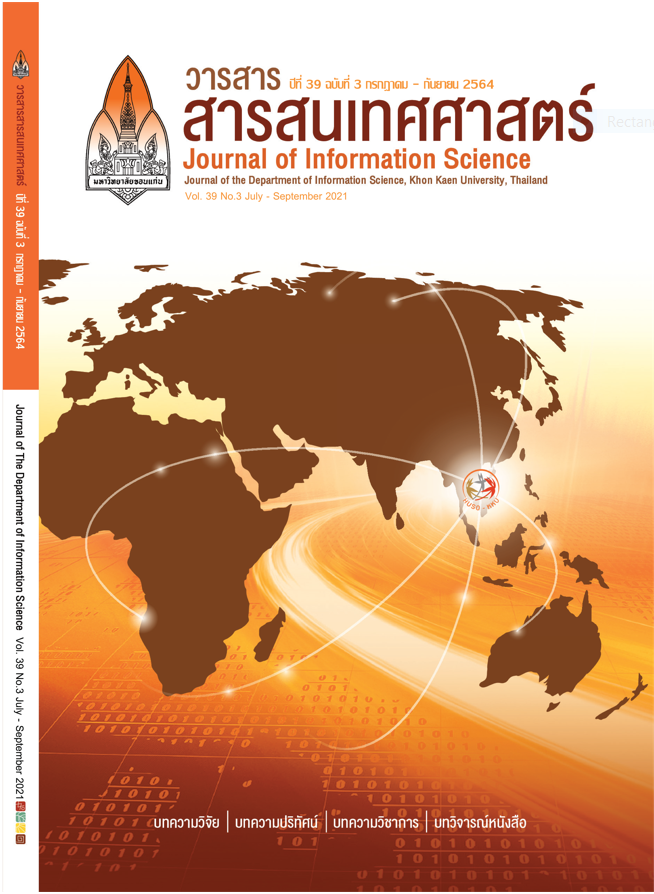The Understanding of the Operators on the Information for the Radio Broadcasting Experimental Operation
DOI:
https://doi.org/10.14456/jiskku.2021.22Keywords:
The Information understanding, Radio broadcasting experimenter, The operation of radio broadcast experimentalAbstract
Purpose of the study: This research attempts to gain understanding of the information used for experimental radio broadcasting operations of the broadcasting operators.
Methodology: This survey study used the assessment forms for collecting data from the sample group of 331 persons comprising 271 operators (81.87%) who were allowed to carry out experimental broadcasting operations and 60 persons (18.13%) who were suspended to conduct the experimental broadcasting. This investigation was conducted in 20 provinces in the Northeast, Thailand using frequency and percentage as its data analysis.
Main findings: Both groups of the experimental broadcasting operators grasp understanding of the information used in the experimental broadcasting operations at the high and medium levels at 62.69% and 59.31% respectively. They gain very high level of understanding in the information classified by each issue of the application for the experimental broadcast permit (62.58% and 64.86%), followed by the medium level in the information for management of experimental broadcast operations at 43.36% and 45.56%. With regard to the functional roles of the experimental operators their understanding was found to be at the great and medium level at 63.22% and 49.31%, while the implementation of experimental broadcasting mission their understanding was reportedly as the greatest and great level as 81.55% and 77.50%.
Applications of the study: Findings from this study will be presented to the NBTC for planning its promotion of broadcasting knowledge to the general public, experimental broadcast engagement, and for prevention of broadcasting suspension due to violation of rules and regulations of the experimental broadcast operations.
Downloads
References
Act on the organization to allocate frequency and regulate broadcasting television and telecommunication B.E. 2000. Government Gazette, 117, 1–33.
Ministry of Interior. (2000). Building Control act (No. 3), B.E. 2000. Government Gazette. 117, 1-14.
NBTC announcement on regulations for license to operate radio broadcasting B.E. 2012. Royal Gazette. 129, 21-67.
Office of the Consumer Protection Board (1979). Consumer protection act, B.E. 1979.
Office of the Council of State (1954). Air navigation act B.E. 1954. Government Gazette, 71, 54 – 66.
Office of the Council of State (1954). Consumer protection act. Fri. 2009. Royal Gazette, 96, 30 – 47.
Office of the NBTC (2012). NBTC notification re: rules and operating procedures for operators of radio and n broadcasting and television services the event of a disaster or emergency, 2012. Government Gazette, 129, 48-50.
Office of the NBTC (2012). NBTC notification re: rules for testing of technical standards of radio broadcasting machines for radio broadcasting experiment, B.E. 2012. Government Gazette, 129, 2-16.
Office of the NBTC (2013). NBTC announcement on regulations for license to operate radio broadcasting B.E. 2013. Royal Gazette. 130, 1-18.
Office of the NBTC (2016). NBTC notification re: rules for measuring spurious emission of radio broadcasting experiment stations B.E. 2016. Government Gazette, 133, 1-18.
Office of the NBTC. (1992). Radio communications act B.E. 1955, as amended (No. 3), B.E. 1992. Government Gazette, 129, 1-8.
Office of the NBTC. (2008). Broadcasting and television business act B.E. 2008. Retrieved 1, January 2020, from http://web.krisdika.go.th/data/outsitedata/








